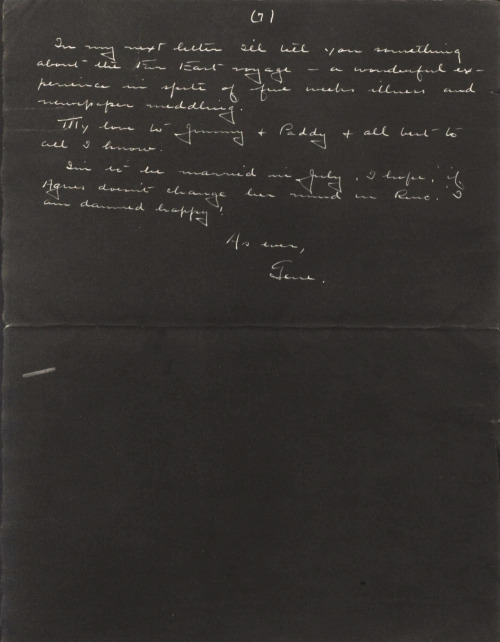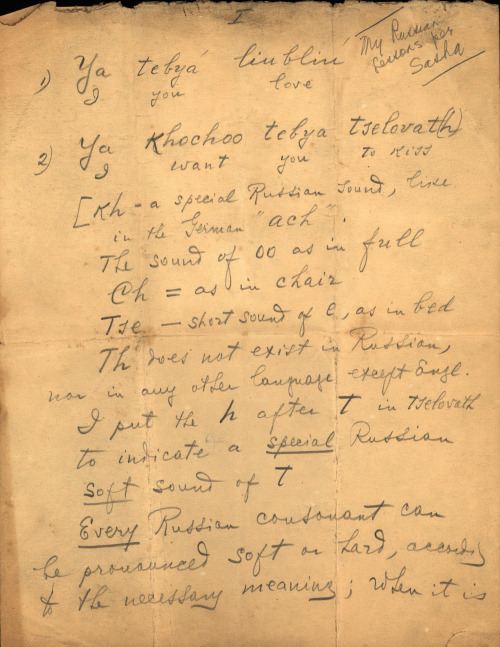Happy National Handwriting Day!This year, we bring you a selection of correspondence andother handwr
Happy National Handwriting Day!This year, we bring you a selection of correspondence andother handwritten items from the M.Eleanor Fitzgerald Papers (UWM Mss 13). According to nationaldaycalendar.com,National Handwriting Day was established in 1977 by the Writing InstrumentManufacturers Association, “to promote the consumption of pens, pencils, andwriting paper.” January 23rd is John Hancock’s birthday, the firstsigner of the Declaration of Independence, making it an understandable date forthis holiday.M. Eleanor Fitzgerald,known to friends as Fitzi, was bornin 1877 in Deerfield, Wisconsin. In the early years of the twentieth century,she grew interested in the anarchist and labor movement, prompting her to beginworking on the behalf of imprisoned labor leaders. She was close withanarchists Emma Goldman and Alexander Berkman even after their deportation fromthe US in 1918. During the 1920s she joined the Provincetown Players, bringing her in contact with many playwrightsincluding Eugene O’Neill and E. E. Cummings. Her papers include correspondencewith many of these individuals as well as others, leaving us with a wide arrayof different handwriting.The first pair of photos above are the first and last pageof a letter sent from Eugene O’Neillto Fitzgerald in 1929 (box 2, folder 24). Born in 1888, O’Neill is a notableAmerican playwright and Nobel laureate. Many of his plays were put on by theProvincetown Players in the 1910s and 1920s. By the time of this letter, he hadwon three Pulitzer Prizes for hisplays Beyond the Horizon (1920), Anna Christie (1922), and Strange Interlude (1928). He would go onto win one more Pulitzer for Long Day’sJourney into Night (posthumously in 1957) and the Nobel Prize in Literaturein 1936. His letter checks in on mutual friends, discusses Strange Interlude’s success and his other productions, and mentionshis upcoming wedding to Carlotta Monterey, provided that his current wife,Agnes Boulton, doesn’t change her mind about their pending divorce.The second photo above comes from a letter sent in 1920 fromAlexander Berkman to Fitzgerald (box1, folder 11). Known as Sasha, Berkman was born in 1870 in present-dayLithuania, then part of the Russian Empire. He immigrated to the United Statesin 1888 where he became a part of the anarchist movement with friend and lover Emma Goldman. He was imprisoned forfourteen years in the 1890s for the attempted assassination of Henry Clay Frickand later another two years for his opposition to the draft in 1917. It was inthe intervening years that he met Fitzgerald and they became close friends. Hewas deported to Russia under the 1918 Anarchist Exclusion Act. After growingdisillusioned with the Bolshevik movement, both Berkman and Goldman left Russiain 1921, moving around Europe, often illegally, according to letters sent toFitzgerald. The letter above is addressed to Fitzgerald asking about previousletters he had sent to her as he had not heard from her in a long time. Hesuggests different people to send letters through to ensure that they make itto him in Moscow. The rest of the letter, beginning at the end of this page, isrushed as Berkman needed to catch a train for Petrograd. Per other letters sentto Fitzgerald, he seemed to bounce between the two cities through much of 1920before leaving Russia and ending up in Stockholm in 1922.The final photo above comes from Russian lessons given to Fitzgeraldby Berkman, labeled by Fitzi as “My Russian Lessons per Sasha” (box 1, folder22). These undated notes show Berkman’s attempts to teach Fitzgerald Russianwith a Latinized alphabet, explaining the different pronunciations of lettersand letter combinations. Several letters from Berkman indicate a deep love andaffection between the two, making phrases about love and kissing a logicalintroduction to the language.More of Fitzgerald’s correspondence, both typed andhandwritten, can be found in her papers at the UWM Archives. This National Handwriting Day, slow down and take abreak from screens and try hand writing a note to friend or penning a journalentry.-Samantha Dickson, Archives Graduate Intern -- source link
#uwm archives#eugene oneill#alexander berkman#provincetown players#russian#language#letters#handwriting#correspondence#anarchism#emma goldman#anarchist



